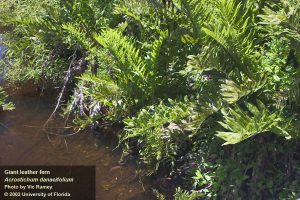 We have several different ferns which behave themselves to much better than Boston fern but still have similar light (shady) requirements.
We have several different ferns which behave themselves to much better than Boston fern but still have similar light (shady) requirements.
Here are just a few:
1. Royal fern, Osmunda regalis, can be found growing in cold hardiness zones 3-10; shrives in rich, organic soils, can reach heights up to 6 feet but will generally die back in the winter. Good news – the deer don’t seem to like it. New growth in the spring is a pretty pale pink.
2. Giant leather fern, Acrostichum danaeifolium, is a Florida native fern. This can grow in cold hardiness zones 8b – 12b – definitely not a northern U.S. fern. Individual fronds can grow up to 12 feet tall and the plant can spread to 5 feet wide. This fern prefers to grow in moist soil and is often found along fresh water swamps. To keep the plant looking its best in cultivated areas, consider removing old fronds and annual fertilization is not required.
3. Maidenhair fern, Adiantum spp., is also a Florida native fern. Maidenhair fern has delicate fronds and is fund more often in Central and Southern Florida in cold hardiness zoned 9-11 but could be planted along the eastern coastline. This fern might be a good choice for smaller landscape areas as it grows 3 feet tall and 3 feet wide. The southern maidenhair and brittle maidenhair grow best in alkaline soils while others grow best in acid soils. With so many of our along the coast having high soil pH readings, this is a good plant to consider for shady sites. It will cascade over the side of a container in a shady garden spot. Some of the available species include:
- Adiantum capillusveneris, southern maidenhair, 1.5 feet tall; A. hispidulum, rosy maidenhair, one-foot-tall, young fronds rosy brown; A. pedatum, western maidenhair, 1 to 2.5 feet tall, most popular one grown; and A. peruvianum, silver dollar maidenhair, 1.5 feet or more tall, leaf segments quite large, up to 2 inches wide. Then consider other common ferns such as holly fern, autumn fern, and staghorn fern.
 0
0
